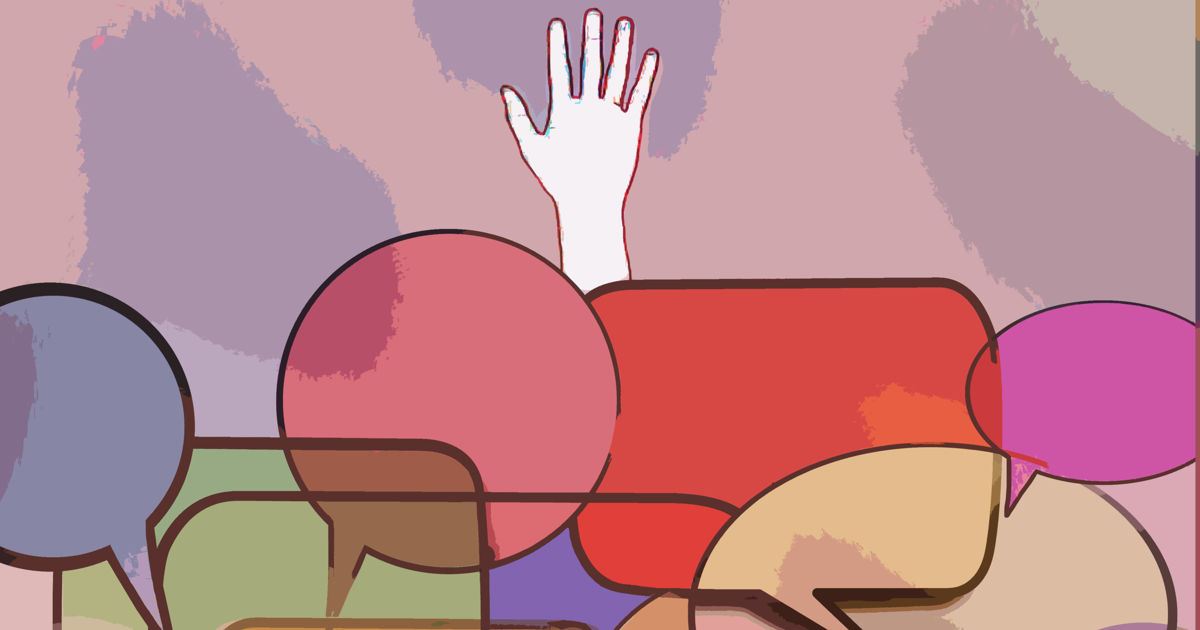Clubhouse: “Addictive!” or “Sheer and utter waffle!”? Young creatives sound off
Clubhouse is the new app on the block and is making sound-waves in the creative community. But is it just filling a social space in our currently locked down lives, or can it continue to make noise post-pandemic? Amy Kean talks to a series of young creatives to find out.
AD INDUSTRY DISRUPTED, said the promotional picture being shared on social media for all the wrong reasons.
Martin Sorrell, the leader of the pack, would be talking with three other white men, all CEOs, about how to shakes things up. Kwasi Amaning Asare, Co-Founder of Esaiyo, was later added as a guest moderator. This conversation amongst game-changers would be happening on Clubhouse, Friday night, 9pm GMT. Hype.
Any trendwatcher worth their salt will tell you that audio is going to be huge in 2021. The future is audio. The future is sound.
Even if Clubhouse isn’t the talk of the town, it’s the talk of one town, at least. Ad town! The place marketers live, where the streets are paved with pithy soundbites and there’s a stereotypical audience segment on every corner. Clubhouse is an audio-only app that launched in 2020, and which has been gathering pace amongst chatty hustlers, since. Any trendwatcher worth their salt will tell you that audio (i.e. the process of hearing things) is going to be huge in 2021. The future is audio. The future is sound.
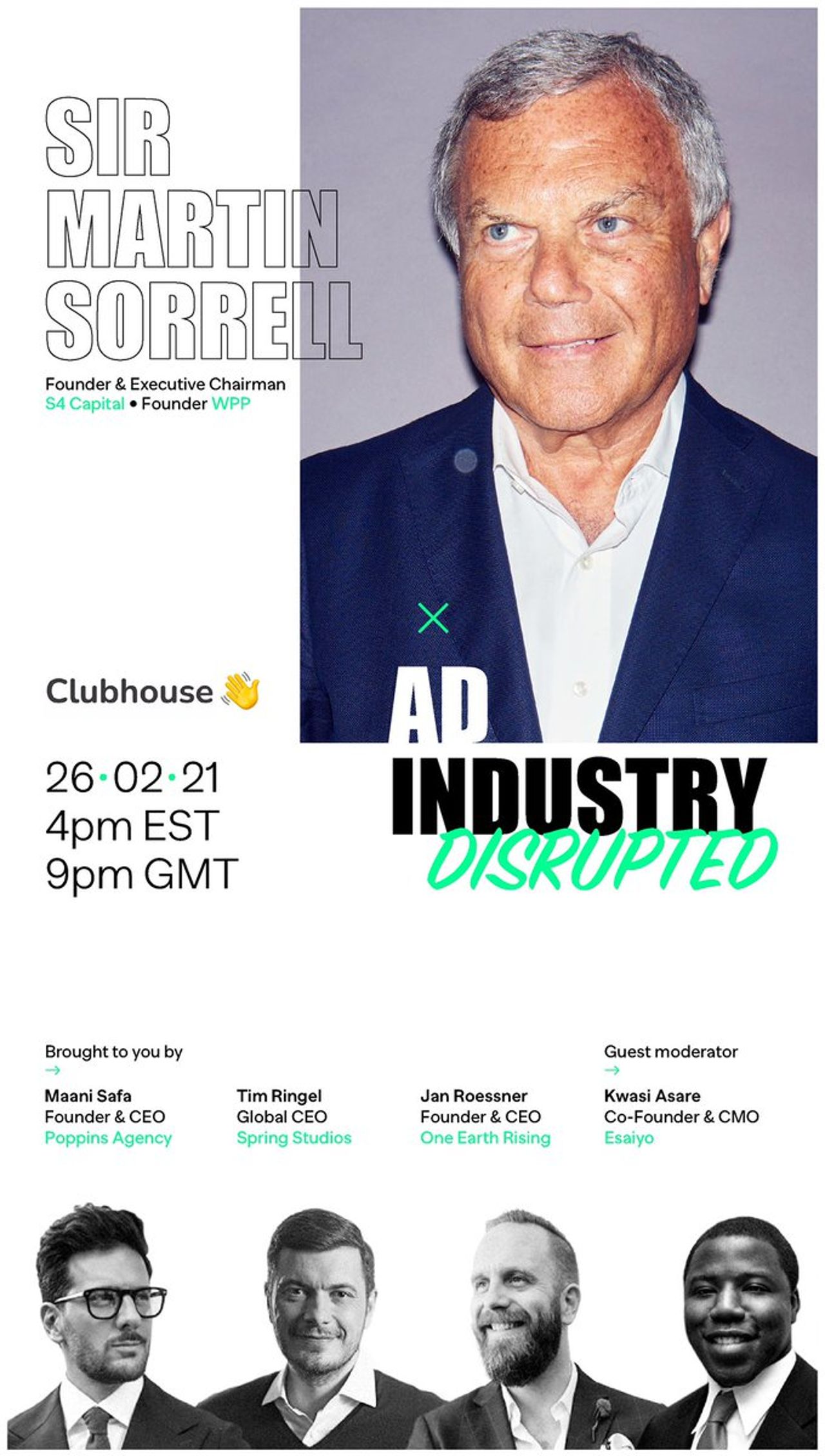
Above: A recent Clubhouse conversation, which featured Sir Martin Sorrell.
Right now, Clubhouse only has 10 million downloads globally, and two million weekly achieve users (stats from Influencer Marketing Hub) but, for a small, young app, it’s made a mighty big noise on the socials. This could be because last month the app was blocked in mainland China, or because of its dubious approach to privacy (the app creates shadow profiles of non-members in someone’s contacts, and records conversations in private rooms). But mostly it’s built a buzz due to exclusivity. Last December, an article in Vogue described the app “The New FOMO-Inducing Social App To Know”. Those Silicon Valley geniuses know how to whip us up into a frenzy!
Much like Studio 54, access to Clubhouse is invite-only. If your name’s not down, you ain’t coming in, bud.
Much like Studio 54, access to Clubhouse is invite-only. If your name’s not down, you ain’t coming in, bud. Those in-the-know, and in-demand, got on there pretty quick. Celebs, journalists, professional networkers. In fact, if you need to ask for an invite to Clubhouse? Well, you shouldn’t be on Clubhouse. Oh, and so far it’s only on iOS, thus excluding circa 55% of smartphone users.
I’ve dipped my ear into Clubhouse’s roaring waves. In the first couple of rooms, I noted that most speakers were dancing (it’s a club!) around an argument without ever really saying anything. Yesterday I hopped into a room about content marketing, “I’m not really the expert, but….” were the first words I heard, and then I drifted into a meditation room, but the room owner’s reception kept cutting out. Stressful. I’ve seen a few rooms focused primarily on talking (bitching) about social media personalities.
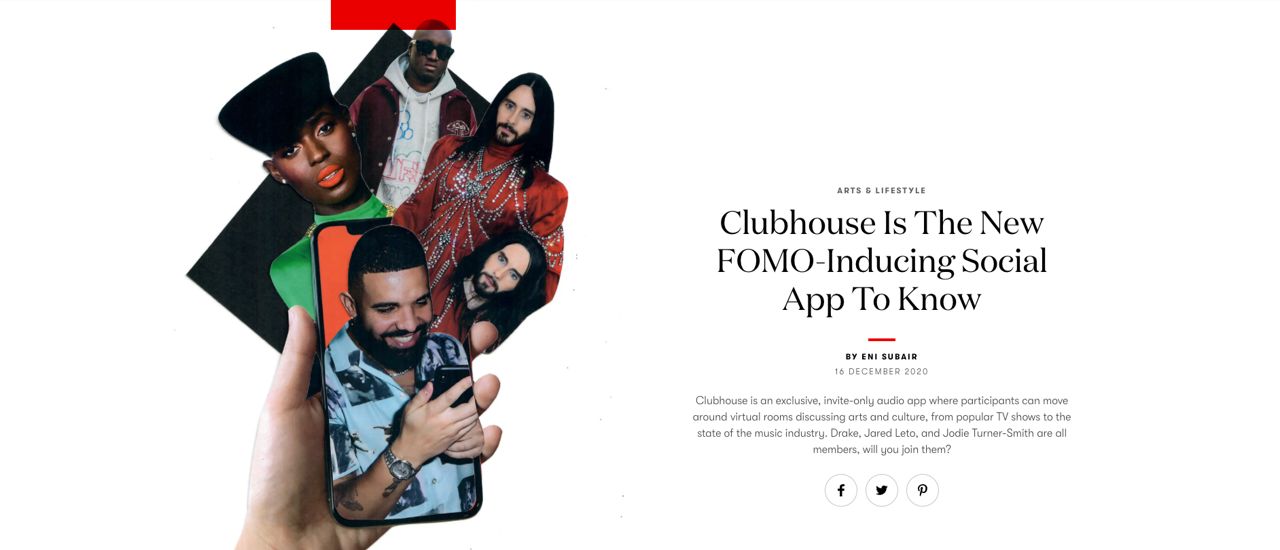
Above: Vogue recently described Clubhouse as “The New FOMO-Inducing Social App To Know”.
But is the platform just another place for trash talk, hustle chat, manels and Martin Sorrell’s DiSrUpTiOn? Or could it become the source of some of the most exciting thought-leadership to happen to business since the word UNLEASH was invented? I asked our industry’s rising stars to share their thoughts.
Who isn’t a sucker for exclusivity and the right celebrity endorsement?
Turns out that up-and-coming creatives aren’t resistant to a healthy dose of FOMO. “Who isn’t a sucker for exclusivity and the right celebrity endorsement?” said Stefan Foreman, a student of Creative Advertising at the University of Lincoln, and ‘a copywriter in denial with art-directorial tendencies’. He, like many others, was desperate for an invite to see what the fuss was about.
“Surprisingly, wangling an invite to Clubhouse isn’t too much of a struggle,” Foreman said. “Navigating its masses of rooms and speakers is though. There is a disconnect in most cases; unedited, live content, despite its mystique, is a double-edged sword. Despite intending to make the best use of rooms most applicable to me as a young creative, the extent of my Clubhouse usership thus far extends to mainly Elon Musk on SpaceX and “Is Kevin Hart Funny?”.

Above, left to right: Micky Jones, Stefan Foreman and Priscilla Britton.
Some of its junior users are huge fans. For young creatives in particular, it offers them up-close-and-personal access to thought leaders that may have been harder to access, pre-lockdown. In the old days you’d have to travel to an event and potentially pay a lot of money for 30-minutes of rehearsed presentation. Clubhouse, of course, is unfiltered and often spontaneous.
It was interesting being exposed to many different viewpoints and the talks being in a more relaxed format was inviting.
Mia McGlynn, a creative student at the University of Central Lancashire, said: “I really like the concept of this app; live podcast-like talks from an industry that you can dip in and out of. It was interesting, as an advertising student, being exposed to many different viewpoints and the talks being in a more relaxed format was inviting.” For Beka Bishop, an artist management assistant and podcast host, the platform has worked wonders for her career: “I have gotten job offers just from being in rooms and sharing my opinion and expertise!” she said.
But Beka does note that playing an active role in the Clubhouse community requires a bravery not everybody may possess: “The individuals who aren't afraid of speaking up and asking questions are the ones that excel on Clubhouse. The best content in my experience has always come from the smaller rooms (100-200 people) because people are real and raw, sometimes sharing information that people pay money to get!”
Many people’s bios are littered with dollar sign emojis and bags of cash, their rooms focused on how to make a cool mil before breakfast.
Money is a recurring theme on the platform. Many people’s bios are littered with dollar sign emojis and bags of cash, their rooms focused on how to make a cool mil before breakfast. Although Christian Gumbura, who works in programmatic for media agency PHD, wondered whether Clubhouse was the best place to seek genuine business coaching expertise. “The more ‘professional’ side of the app seems like a lot of people who enjoy being on panels and talking about their achievements,” he said. “There’s a lot of educational/masterclass rooms on how to make yours a seven-figure business, daily billionaire habits or stock market rooms. To me, it seems there are way more options to learn these things effectively outside of Clubhouse.”
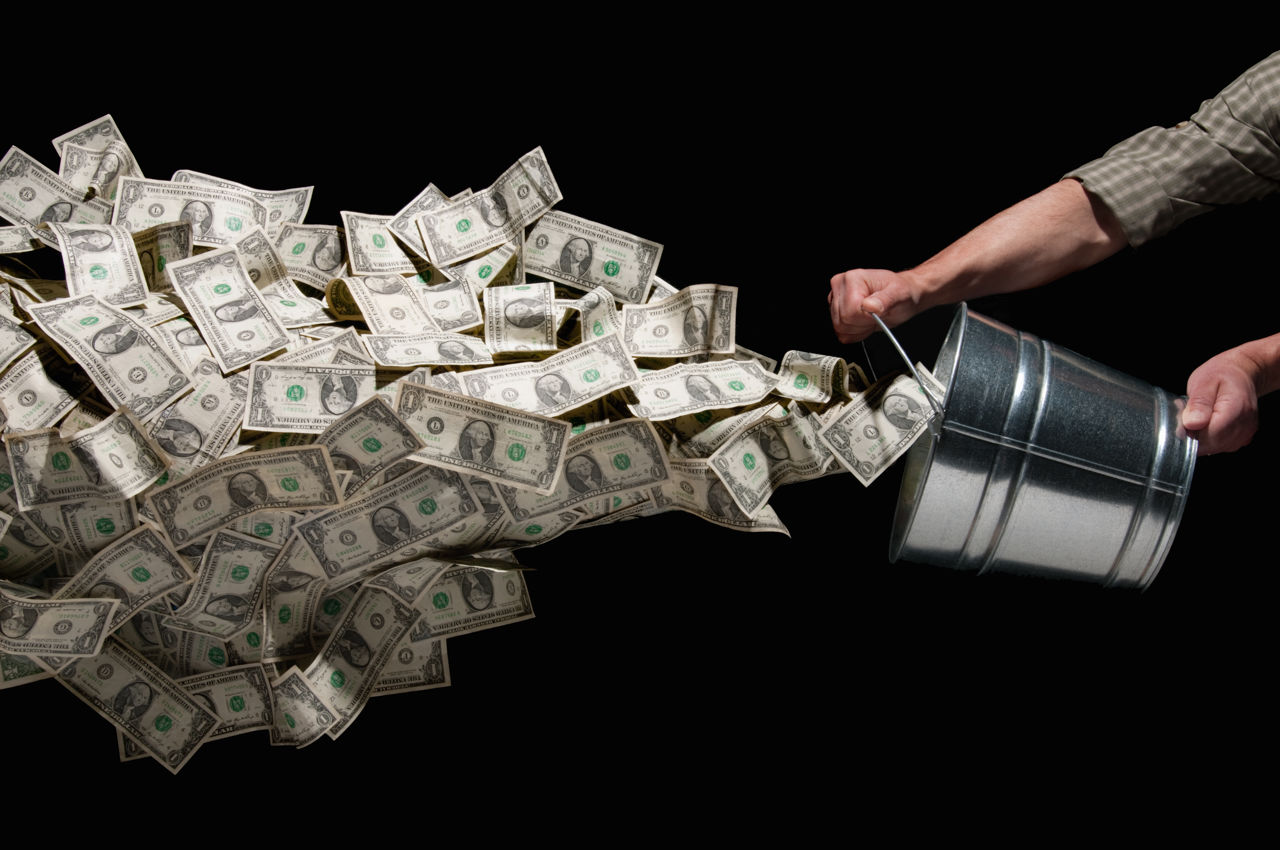
Above: Money and how to make it is a recurring theme on Clubhouse.
Micky Jones, Junior Copywriter at RAPP agrees: “Clubhouse is a mixed bag. I often find the clickbait rooms with titles indicating you can chat to 'millionaires' and 'hustlers', and I’ve wasted 10 minutes of my life listening to marketing bros making dollar but gaining very little interaction and knowledge in return.”
Unfortunately, one of the first rooms I joined had overtones of misogyny.
Hearing some of the accounts of testosterone-fuelled rooms, with bitcoin buzz, aplenty makes me wonder whether Clubhouse might be the Fyre Festival of the app world. Lucy Brine, a Creative Industries student from Kingston University, didn’t have the best first impression of the app: “Whilst I do believe that Clubhouse could be a fantastic platform for discussion and debate, it does come with downfalls, as every social media app does,” she said. “Unfortunately, one of the first rooms I joined had overtones of misogyny. The topic of discussion, ‘Are you OK with being the side chick?’, sparked some interesting discourse about appearance being a valid reason for a man to cheat on a woman.”
Gosh. I guess in essence, every social platform is the same in that it’s only ever as good as the people using it. A recent New York Times article announced that Clubhouse influencers are reinventing the medium, gaining constant live access to their most devoted fans. It’s easy to see why the app quickly became a haven for creators. Last Christmas, a professional cast and choir staged a live version of The Lion King, organised by executive producer and director Noelle Chesnut Whitmore. Over 5,000 people tuned in. At the time, it really did seem like something special was happening

Above, left to right: Christian Gumbura, Mia McGlynn and Janan Ahmed.
Priscilla Britton, an Account Manager at adam&eveDDB, was inspired to begin with, before the shine began to fade. “I had a short-lived addiction to Clubhouse," said Britton. "That place where spontaneous rooms appeared, filled with unfiltered conversation that spoke to my desperate need for social interaction during an endless lockdown. I unashamedly admit that I once spent 10 hours stumbling across spontaneous moments that the platform made possible. I was here for it all.
“I listened and learned from Misan Harriman - photographer for both Vogue and Harry and Meghan - as he spoke with wisdom. I uncovered rooms where people played tic-tac-toe using their display pictures as noughts and crosses. There was a Love Island-eqsue gameshow, where new faces were brought to the stage to couple up. To set the tone of the day, group mindfulness practises took place and I listened to live DJ sets that brought big vibes and energy. But now? It’s another platform with the same people and conversations found on other apps. They've all migrated, and brought the same beige chat with them.”
As invites now flow freely, and the platform becomes populated with extroverts eager to be heard, separating the decent from the dire takes time.
Janan Ahmed, Senior AV Account Executive at Starcom was also charmed. To begin with. “On first glance, the simplicity and aesthetic of the app is pretty sweet; I liked it. And in terms of functionality, it’s like podcasting and live radio had a baby.” But as invites now flow freely, and the platform becomes populated with extroverts eager to be heard, separating the decent from the dire takes time. “Whilst I love the concept of being able to dip into conversations that spark interest, and listen to well-versed individuals talking on their field," continues Ahmed, "I’ve found myself, on a number of occasions, jumping into these rooms, keen to listen in on the topic of discussion, only to be met with waffle. Sheer and utter waffle.”
Who knows what will happen after lockdown ends and our lives return to normal-ish. Perhaps Clubhouse’s fans will stay loyal, their cries of NFT being the NBT bouncing off the walls of every room. Maybe the extroverts will find somewhere else to play. But it’s safe to say that amongst the ad industry legends of tomorrow, the mobile equivalent of jumping on top of a cardboard box at Speaker’s Corner in Hyde Park has definitely made a lasting impact.
)

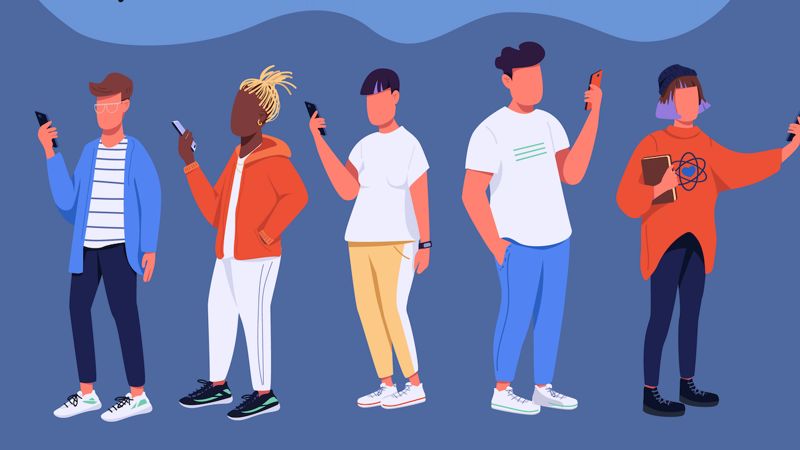


 + membership
+ membership







